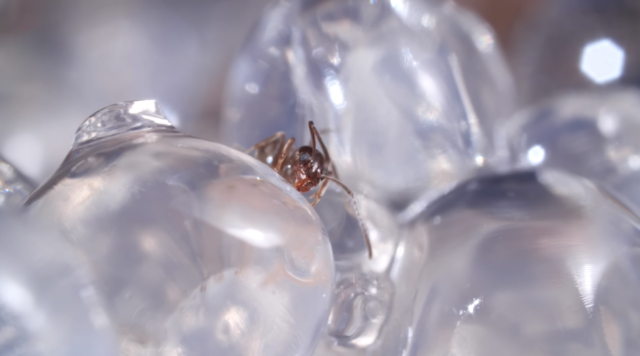This is the story of invasive citrus psyllids and their ant bodyguards vs. predators, parasites, a team at U.C. Irvine, and citrus growers who provide oranges and orange juice.
What does candy poop have to do with all of this? KQED’s Deep Look explains the video above.
First detected in August 2008, tiny Citrus Psyllids can ruin oranges, ravaging the citrus industry if given the opportunity. They feed on young citrus leaves and are a vector for the bacterium Candidatus Liberibacter asiaticus, which causes citrus greening disease. From Deep Look:
“Citrus greening often causes patches of leaves to turn a blotchy yellow and fruit that is green and bitter. These yellow patches are typically asymmetric, which helps tell it apart from other issues like nutrient deficiencies. Trees eventually lose their leaves, stop producing fruit and die.”
Farmers need to eradicate these invasive insects from their orchards, but spraying with pesticides is detrimental to animals and humans. It’s an ecologically costly option that’s also not effective in the long-term, especially for below-ground ant colonies.
After studying this problem, researchers at UC Irvine proposed a solution: Invisible lasers, psyllid cadaver-inhabiting wasps, and deadly sugar water delivered in tiny biodegradable seaweed balls.
The seaweed gel balls are soaked in sugar water and 0.0001% of the insecticide thiamethoxam that local but invasive Argentine ants will ingest and carry back to their massive nests.
Argentine ants happen to be ranchers of citrus psyllids—they harvest the psyllids’ “honeydew” or candy ribbon poops. The ants defend the psyllids like a cowpoke protects a herd of cattle, chasing away predators that might otherwise decimate their numbers.
But no ants, no protection. And that’s when parasitoid wasps can attack the psyllids, helping the farmers keep their orchards healthy.
Watch more from Deep Look on YouTube or TKSST.com.
Then watch these related insect videos:
• How can weaver ants protect an entire orchard?
• Front-flipping psyllids in slow-motion
• Why do Leafcutter Ants cut leaves and carry them away?
Curated, kid-friendly, independently-published. Support this mission by becoming a sustaining member today.




